|
2 Picardy Road
Belvedere
https://whatpub.com/belvedere
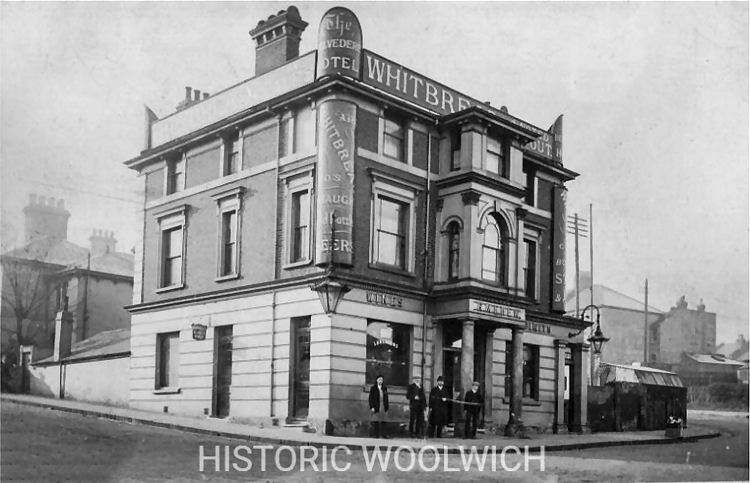 Above photo
date unknown, by kind permission Chris Mansfield.
http://www.chrismansfieldphotos.com/
by Colin Manning |

Above photo, circa 1904. As the signage shows, the pub was a tied
house, within the ever-expanding estate of Whitbread's. |
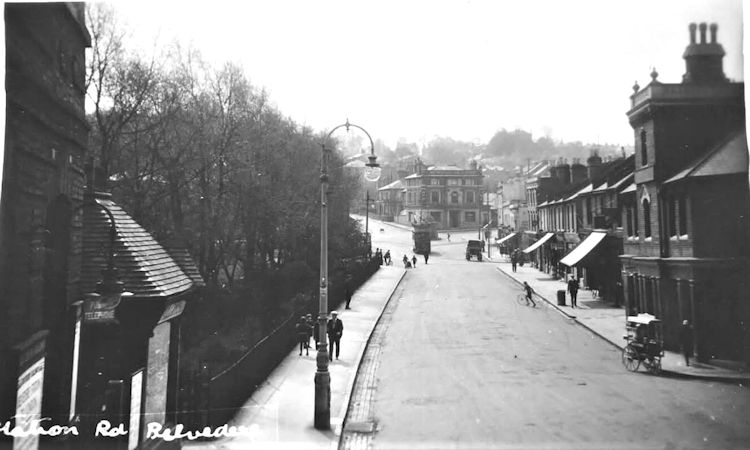
Above postcard, date unknown. |
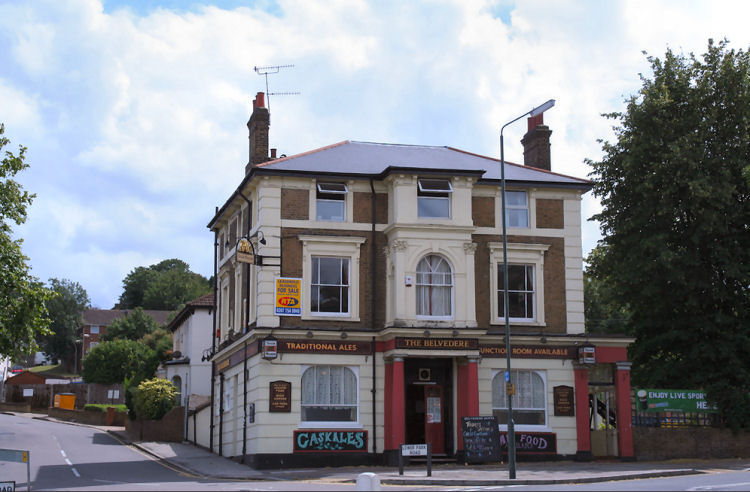
Above photo 2006 by Dave Patten
Creative Commons Licence. |
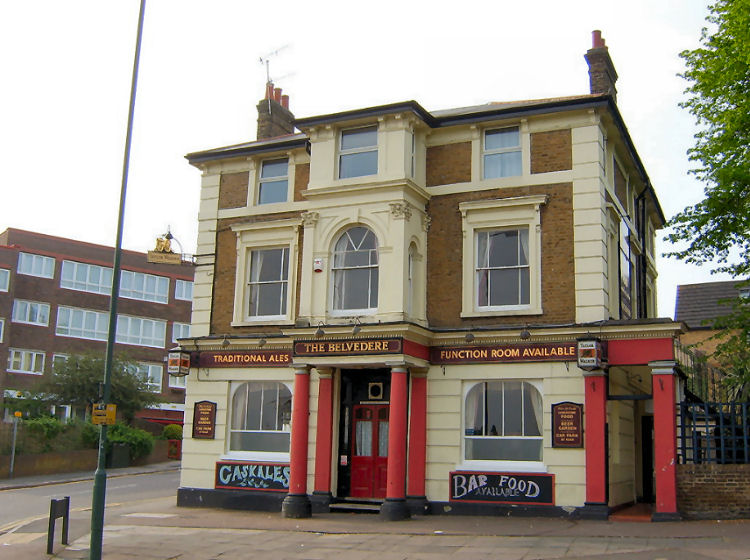
Above photo, 2006 by Steve Thoroughgood. |
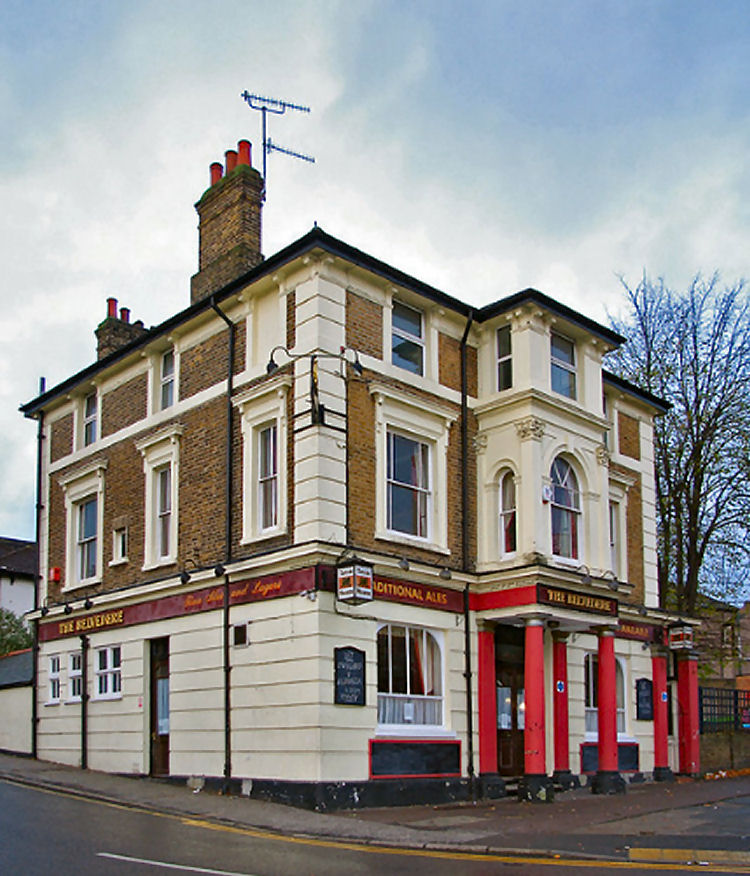
Above photo, 2009 by Steve Thoroughgood. |
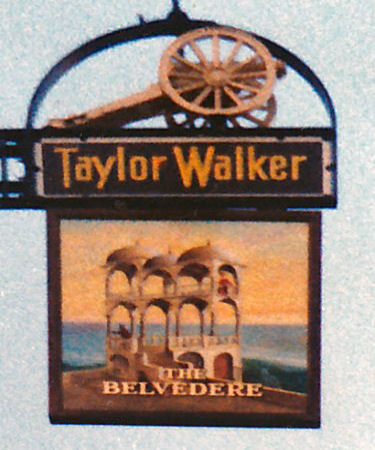
Above sign, December 1986.
With thanks from Brian Curtis
www.innsignsociety.com.
|
I have just added this pub to that list but
your help is definitely needed regarding it's history.
Belvedere now being Greater London from 1965 but was part of Kent prior
to that, I will be focussing my research on Kent itself, but as the information is found or sent to me, including photographs, it will
be shown here.
Thanks for your co-operation. All emails are answered.
|
Kentish Chronicle, Saturday 8 October 1864.
DREADFUL EXPLOSION OF GUNPOWDER AT ERITH.
Click
for full account.
The Inquest.
The inquest was opened on Tuesday morning, at the "Belvedere Hotel,"
about a mile and a half from the scene of the disaster, by Mr. Carttar,
coroner for West Kent, and a jury of 17 of the most influential
inhabitants of the district. The room in which the inquiry was held had
almost every window smashed, and the weather being excessively stormy,
the task of conducting the inquiry was by no means a pleasant one. The
inquest was held upon the dead bodies of three persons which lay
comparatively entire on the ground in the coach-house in the hotel yard.
The remains of Mr. George Rayner, aged 40 years, the foreman to Messrs,
Hall, lay on a mattress, covered up with his own coat. Next him lay
those of Thomas Hubbard, aged 52, and John Yorke, a boy of only 13.
Numbers of ghastly parcels were deposited on the floor of the outhouse,
and their blood-stained appearance gave a sickening indication of there
contents. In them were collected different portions of human bodies,
supposed to be the sole remains of the men Wright and Yorke, who were
known to have been at work in the magazine at the time of the explosion.
In addition to the men whose lives are thus known to be lost, we may
state that, on board the barge Harriott, belonging to Messrs. Monk and
Co., were known to have been John Dadson, captain, Daniel Wise, mate,
and William Dadson, son of the captain. On board the barge Good Design,
belonging to Messrs. Hall, were William Jemmett, captain, and Lake
Barber, mate. All these human beings completely disappeared along with
the barges, and not a trace of them has as yet been found. The scene of
the explosion can be viewed from the "Belvedere." 300 marines are
still
actively at work strengthening the temporary embankment, for the wind
from the north-east was high, and threatening. All apprehension of the
giving way of the barrier is now, however, laid, and the measures still
in progress are designed to render assurance doubly sure.
The jury having been sworn, the Coroner opened the proceedings with a
short address. He said that the jury would find their duty an anxious
and onerous one, but he was sure that so respectable a body of jurymen
could not fail to give satisfaction to all parties interested in the
proceedings and to the world at large. There was no tribunal so well
qualified as the coroner’s court to investigate, not only the fact of
the deaths of persona killed by great calamities, but; for the inquiry
into the circumstances attending the occurrence. It was not necessary
for a person to be charged at the bar as in other courts, and they were
not therefore restrained from going into evidence that did not strictly
bear upon the one point of the guilt or innocence of that parson. His
own knowledge of such calamities was, he was sorry to say, not limited.
He had too frequently been called upon to inquire into the causes which
resulted in fatal explosions, but this was the first instance in which
he was concerned in the case of an explosion of a powder magazine or
store-house. He would not prejudge the present case by a word. He knew
nothing of it but by the general reports which was known to all. But he
was confident that from Messrs. Hall and the other proprietors the court
would obtain every facility for arriving at a satisfactory conclusion,
and it was for the jury to see what recommendations they might deem it
useful to submit to the consideration of Government for the regulation
of such establishments. It was deemed necessary to prohibit the storage
of more than a certain quantity of petroleum and fireworks, and it was
hard to say why no limit should be placed upon the amount of gunpowder,
which was the most dangerous compound of all. That was, however, merely
his own suggestion. Without doubt it was true that even the explosion of
a very small quantity of powder would as effectually destroy the lives
of all on the spot as would the explosion of an enormous quantity. But
there could be no comparison of the results in respect to the
destruction to property and life and limb in the surrounding districts.
In all the districts bordering upon the metropolis houses were springing
up, and the population was becoming denser year by year, end therefore
the question of the storage of highly dangerous compounds was of the
utmost importance and whatever time the court might bestow upon the
matter would not be thrown away. He proposed, in the first instances to
take evidence as to the identification of the deceased persons as far as
it could now be obtained. He would then take the evidence of two or
three witnesses: but (said the learned gentlemen, referring to the
fearful state of the room in which the jury were assembled, and through
the apertures of which the wind roared and bawled) I do not wish after
the loss of life that has already taken place, to jeopardise your lives
or your heath by going on with the proceedings here. If you think it
requisite, we can walk to the site of the powder magazines, and inspect
the place, but I believe not much information is to be gained by doing
so.
Several of the jurors stated that they had nearly all visited the scene
of the explosion, and it would only be a waste of time to proceed there
now.
Mr. Poland then rose, and addressing the court said that he appeared on
behalf of Messrs, Hall and Son, the proprietors of one of the powder
stores, and he wished to state that it was the desire of those gentlemen
to give every facility and requisite information to the court. If the
result of the inquiry should show to them any improved method of
conducting their business, so as to conduce to the safety of all
concerned, they should feel deeply thankful.
The jury having viewed the bodies and returned to the inquest room,
Waiter Silver, who appeared at the table with his head bound, having
been injured by the explosion, was called to identify the bodies. He
stated that he formerly resided close to the magazine but his
dwelling-house had been razed to the ground by the explosion. He was a
storekeeper in the employ of the Low-wood, Liverpool, Gunpowder Mill
Company, Limited. The establishment was formerly known as Day, Barker,
and Co., and their offices were 63, Fenchurch street. He then identified
the bodies lying in the neighbourhood of the inquest-room as those of
George Hubbard, a labourer engaged in buildings erected near the
magazines, and as one not at all conversant with the works. He also
identified the body of G. Rayner, who was the foreman of the magazine
and that of John Yorke as the son of William Yorke, under storekeeper,
who is missing.
Mr. Sydney Turner, house-surgeon of Guy's Hospital, was next sworn and
said:- I have under my care some of the persons injured by the
explosion. With the exception of Eliza Osborne, who is in a dangerous
state, all the rest are doing well. The youngest is six and the next is
a girl of nine years of who is sufficiently well to be examined, and
indeed could be examined today. Edward Singleton has a fractured
humorous, and cannot be examined for a month, Emma Wright a woman of
forty, has a fractured collar-bone, and will not he able to be examine
for three weeks. Mary Yorke, who has a fractured thigh, is not likely to
be able to be examined for six or seven weeks. Another under my charge
is Harriet Rayner, the widow of the man who was killed, and she is
suffering from a severely contused shoulder, and cannot be examined for
a week or two.
Thomas Churton, of Erith, sworn, stated that he was a surgeon, and
described the condition of some of the mutilated portions of bodes, part
of which, he believed, belonged to one of the unfortunate man named
Wright. He also described the condition of two children, one six years
of age named Sims, and another named Yorke, twelve years of age, very
seriously injured.
The Coroner then stated that his object in taking this evidence was to
ascertain when it would be possible to proceed with the inquiry, and
obtain a narrative of the occurrence from the mouths of those who
actually experienced its effect.
Police-sergeant 15 R stated that seven persons were yet missing, of whom
no tidings could be obtained, five of them being from the barge, but,
subsequently, one of the legal gentlemen present in the room said that
one of the missing parties had since turned up and was safe at home.
This being all the progress that could be at present made, the inquiry
was adjourned till next Tuesday, at the Avenue School-room, Erith.
|
|
From the Southeastern Gazette, 23 January 1866.
Petty Sessions, Jan. 20. (Before Sir P. H. Dyke, Bart, Sir F. Carrie,
Barb., and James Chapman, Esq.)
The license of the “Belvedere Hotel,” Erith, was transferred from Mr.
George Gilbert Saggers to Mr. Thomas Instone.
|
|
From the Southeastern Gazette, 20 March 1866.
ERITH. Fatal Accident.
An inquest was held before C. J. Carttar, Esq., on Monday, at the
“Belvedere Hotel,” Erith, respecting the death of a son of Captain Henry
Frederick M’Killop, a Government inspector of powder depots, living at
Bletchington-house, Belvedere. The deceased was only 8 years of age, and
was much beloved in the locality in which he resided, as a bright
generous-hearted little fellow. The circumstances under which he met his
death were unusually painful. It appears that Dr. Gaye, assistant
surgeon of the Woolwich Royal Artillery, sent his servant with a letter
to Captain M’Killop’s, and when the letter was ready the groom led the
horse, which was usually a quiet one, and the deceased was granted leave
to go a little way up the hill on its back, when the animal became
restive, and rearing up struck the groom in the chest, knocked him down,
and for a moment deprived him of breath, after which it galloped off at
a terrific rate, throwing its youthful rider from his seat. One foot
caught the stirrup, and he was thus carried forwards for some distance
head downwards, receiving frequent kicks from the horse, and his head
bumping on the road until he was at length thrown on to the ground. He
was speedily conveyed home, and attended by Drs. Spurrell, Hatton, and
Matthewson, of Belvedere, who found his skull fractured in two places,
and one leg fractured, and an arm broken. In this state he lingered
eighteen hours, when he died.
Verdict, “Accidental death.”
|
|
Islington Gazette, Tuesday 28 October 1873.
Kent. Freehold Cottage property.
Mr. Wagstaff will sell by auction, at the "Belvedere Hotel,"
Belvedere, on Tuesday, November 18th, at 5 for 7 o'clock in the
evening, two freehold cottage residences, being Nos. 5 and 6,
Victoria Street, Belvedere, containing each four rooms, with bay
windows, wash house, and large garden, producing rentals amounting
to £23 8s. per annum. This property is well worthy the
attention of small capitalists and others.
May be viewed, and particulars of sale obtained at the various inns
in the neighbourhood, and of Mr. Wagstaff, auctioneer,
architect, and surveyor, 176, Upper Street, N. |
Latest information from September 2018 tells me that the pub is closed
and the Freehold for sale via AG&G.
LICENSEE LIST
HAZLE John 1861-62+ (age 37 in 1861 ) )
STAGGERS George Gilbert to Oct/1866
INSTONE Thomas Oct/1866+
GIBSON Samuel William 1874-82+ (age 51 in 1881 ) )
GEE Mary Ann to Dec/1890

BLUNDELL Emma Dec/1890+

GEE Basil 1891+
RADFORD Henry 1896-1903+

HEARN Frederick James 1913+
COOK & STRIBBLING 1922+
BAILEY Charles P 1930+
CHANDLER Follan 1938+
https://pubwiki.co.uk/Belvedere.shtml
 From the Kelly's Directory 1903 From the Kelly's Directory 1903
 Maidstone
and Kentish Journal Maidstone
and Kentish Journal
 Census Census
|






